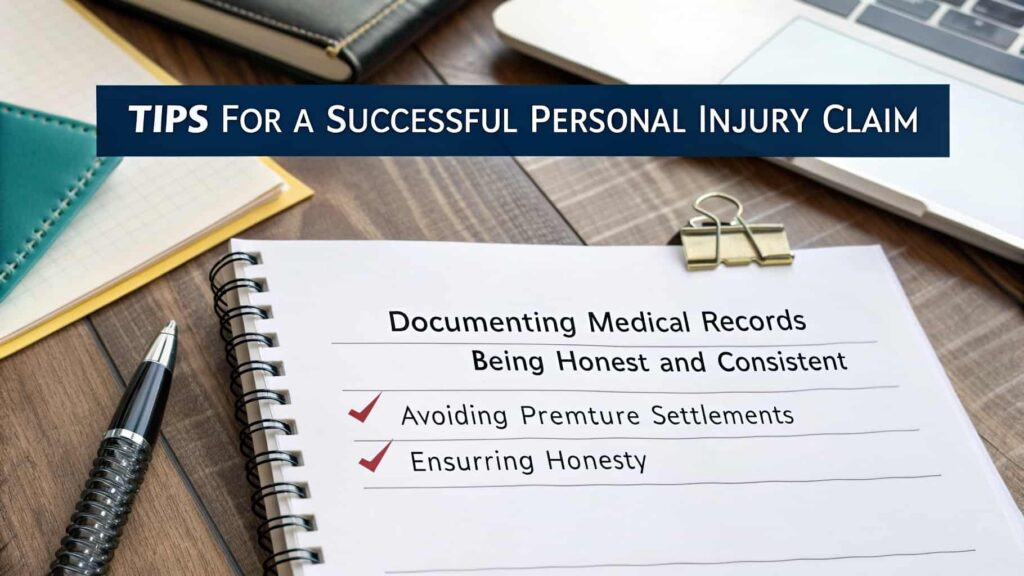In life, accidents happen. But when someone else’s carelessness or wrongdoing leads to your injury, you’re not just dealing with pain and recovery—you’re also facing medical bills, lost income, and emotional stress. This is where personal injury law comes into play. Understanding personal injury law claims is about more than just knowing your rights—it’s about gaining the knowledge to take back control of your life after an unexpected setback.
Whether you’ve been in a car accident, slipped on a wet floor, or suffered due to medical negligence, this guide will walk you through everything you need to know. From key legal concepts to the step-by-step process of filing a claim, let’s dive deep into this essential topic.
What is Personal Injury Law?
Personal injury law—often referred to as tort law—deals with cases in which an individual suffers harm due to someone else’s negligence, recklessness, or intentional misconduct. Unlike criminal law, which focuses on punishing offenders, personal injury law is primarily concerned with compensating the injured party. At its core, it aims to restore the victim’s financial, emotional, and physical well-being after an incident has disrupted their life.

Key Characteristics of Personal Injury Law
- Compensation Focus: The main objective is to provide fair compensation for losses incurred, such as medical expenses, lost wages, and pain and suffering.
- Civil Nature: Personal injury cases are civil disputes, meaning they typically involve private parties rather than the state prosecuting a criminal offense.
- Evidence-Based: Success in these cases depends on the ability to prove that the defendant’s actions (or inactions) directly led to the injury.
The Fundamentals of Personal Injury Claims
While every case is unique, personal injury claims all share a common structure. At the core is the idea of duty and breach. If someone had a responsibility to act in a certain way—for instance, a driver obeying traffic laws—and they failed in that duty, you may have grounds for a case. What follows is the concept of causation: proving that the failure directly led to your injury.
Then, finally, you must show that real damage was done. This could include financial costs, emotional pain, or physical suffering. All of these factors must be proven in court or to an insurance company in order to secure compensation. It’s not just about saying someone did you wrong—it’s about backing that claim with facts, timelines, medical records, and often, expert opinions. For those beginning this journey, learning how to manage personal finances effectively after an injury can make a big difference in maintaining stability during recovery.
Common Types of Personal Injury Cases
Personal injury law covers a wide spectrum of cases. Understanding the different types of cases can help you determine whether you have a valid claim and how best to proceed.
Car Accidents:
Car accidents are among the most common personal injury cases. They typically involve claims related to negligence, such as a distracted or impaired driver failing to maintain control of their vehicle. These cases often require evidence like accident reports, witness statements, and medical records to establish liability and quantify damages.
Slip-and-Fall Incidents:
Property owners have a legal responsibility to maintain a safe environment for visitors. When they fail to do so—such as by neglecting to fix a hazardous condition—a slip-and-fall injury may occur. These cases hinge on proving that the property owner was aware, or should have been aware, of the risk and did not take adequate measures to mitigate it.
Medical Malpractice:
When healthcare professionals deviate from accepted standards of care, it can lead to serious injury or even death. Medical malpractice claims require expert testimony to demonstrate that the provider’s actions fell below the acceptable standard, directly causing harm to the patient.
Workplace Injuries:
Injuries sustained at work may involve claims against employers, equipment manufacturers, or other third parties. Workplace injury cases are complex, often involving both workers’ compensation and personal injury claims, depending on the circumstances and jurisdiction.
Product Liability:
Defective products that cause injury can lead to product liability claims. These cases involve determining whether the manufacturer, distributor, or retailer should be held responsible for failing to ensure the product’s safety.
When You Can (and Should) File a Claim?
Filing a personal injury claim isn’t automatic, and not every injury qualifies. To determine whether you have a case, ask: Was someone else at fault? Did their action (or lack of action) lead directly to your injury? Did you suffer damages that can be proven? Timing is critical. Every state has a statute of limitations—essentially a legal deadline—for filing a claim.
Depending on where you live, you might have one to three years from the date of the injury. Miss this window, and you may lose your right to compensation entirely. It’s also worth noting that fault isn’t always black and white. Some states follow comparative negligence rules, where even if you were partially at fault, you may still recover damages—just a reduced amount based on your level of responsibility. This is why early consultation with a lawyer is vital. They can help assess the facts, determine if a claim is viable, and ensure you don’t miss important deadlines.
Types Of Compensation In Personal Injury Claims
The goal of personal injury law is to restore you to the position you were in before the injury occurred. This is achieved through various types of compensation designed to cover both tangible and intangible losses.

Economic Damages:
Economic damages are quantifiable financial losses that you can document with evidence. These include:
- Medical Expenses: Costs for hospital stays, surgeries, medications, and rehabilitation.
- Lost Wages: Income lost during recovery and, in some cases, future earning potential if your ability to work is affected.
- Property Damage: Expenses incurred to repair or replace damaged property, such as a vehicle after an accident.
Non-Economic Damages:
Non-economic damages compensate for losses that do not have a clear financial value. They include:
- Pain and Suffering: Physical discomfort and emotional distress experienced as a result of the injury.
- Loss of Enjoyment: The impact of the injury on your quality of life and ability to participate in activities you once enjoyed.
- Emotional Distress: Psychological effects such as anxiety, depression, and post-traumatic stress disorder (PTSD).
Punitive Damages:
In cases where the defendant’s conduct was particularly egregious or reckless, courts may award punitive damages. These are not meant to compensate you for your losses but rather to punish the defendant and deter similar behavior in the future.
The Process Of Filing a Personal Injury Claim
Filing a personal injury claim involves several carefully orchestrated steps. Being well-prepared can significantly improve your chances of success and help you navigate the complexities of the legal system.
Seek Medical Attention:
Your health should be your primary concern. Promptly seeking medical attention not only ensures that you receive necessary treatment but also provides critical documentation linking your injury to the incident. Medical records serve as vital evidence in your claim.
Gather Evidence:
Collecting comprehensive evidence is essential. This includes:
- Photographic Evidence: Images of the scene, injuries, and any hazardous conditions.
- Witness Statements: Testimonies from individuals who witnessed the incident.
- Official Reports: Police or incident reports that document the event.
- Correspondence: Any communications with the defendant or their insurance company.
Consult a Personal Injury Lawyer:
A skilled personal injury attorney can be your greatest asset. They bring expertise in navigating the legal process, assessing the value of your claim, and negotiating with insurance companies. Many attorneys work on a contingency fee basis, meaning you pay nothing unless you win your case.
File the Claim:
With your attorney’s guidance, the next step is to formally file your claim. This typically involves submitting a detailed complaint to the at-fault party’s insurer or directly to the court. The complaint outlines your case, the evidence supporting your claim, and the damages you are seeking.
Negotiate or Litigate:
Most personal injury claims are resolved through negotiation. Insurance companies often attempt to settle quickly and for less than what you deserve. Your attorney will work to secure a fair settlement. However, if a satisfactory agreement cannot be reached, your case may proceed to litigation, where a judge or jury will determine the outcome.
Choosing the right legal representation matters. If you’re unsure where to start, learn how to find the best criminal defense lawyer—many of the same principles apply when selecting a personal injury attorney.
Common Challenges in Personal Injury Claims
Even with a strong case, there are hurdles. One major challenge is disputed liability. The person or company you’re filing against may argue that the injury wasn’t their fault—or that you were partially responsible. Insurance companies are notorious for lowballing offers, delaying responses, or outright denying claims. Their job is to protect their bottom line—not yours.
Another complication involves non-economic damages. Because there’s no receipt for pain or suffering, it can be difficult to put a value on it. Strong personal narratives, consistent medical treatment, and expert testimony are key to proving these less tangible losses. Add to that legal deadlines, court procedures, and the emotional toll, and it’s easy to feel overwhelmed. But each obstacle can be overcome with patience, professionalism, and proper support.
The Role of a Personal Injury Lawyer
While you have the right to file a personal injury claim on your own, the complexities of the legal system make it highly advantageous to work with an experienced attorney. Here’s how a personal injury lawyer can make a difference:
Expertise and Guidance
Personal injury lawyers have a deep understanding of the legal framework, including relevant laws, regulations, and case precedents. They can evaluate your case accurately, determine its worth, and guide you through each step of the process.
Negotiation Power
Insurance companies employ teams of adjusters whose goal is to minimize payouts. A skilled lawyer can counter these tactics by presenting well-documented evidence, ensuring that all aspects of your damages are considered, and negotiating assertively on your behalf.
Trial Representation
If your case does not settle out of court, your lawyer will represent you in litigation. They will present your evidence, cross-examine witnesses, and argue persuasively before a judge or jury. This level of advocacy significantly enhances your chances of obtaining a favorable verdict.
Reducing Stress
Dealing with legal proceedings, medical appointments, and the overall recovery process can be overwhelming. A personal injury attorney helps manage the legal side of your case, allowing you to focus on healing and recovery.
Alternatives to Filing a Lawsuit
Not every personal injury claim ends in court. In fact, most are settled outside of it. Insurance settlements are the most common resolution. With strong evidence and negotiation, you can often reach a fair outcome without filing a lawsuit. Mediation is another option, where both sides sit down with a neutral third party to work out a compromise.
It’s less formal than court but still legally binding. For lower-value cases, small claims court may be appropriate. It’s faster, less expensive, and often doesn’t require a lawyer—but you’ll need to make a solid, well-documented argument to win.
Tips for a Successful Personal Injury Claim
Success in personal injury claims is not only about understanding legal principles—it also hinges on how well you prepare and present your case. Here are some actionable tips:

Document Everything
Maintain meticulous records of every aspect of your injury and recovery. This includes:
- Medical records and bills
- Photographs of injuries and the accident scene
- Communications with insurance companies
- Witness contact information and statements
Avoid Quick Settlements
Insurance companies may offer a fast settlement to close your case. While the prospect of immediate cash is tempting, it’s important to wait until the full extent of your injuries and damages is known. An early settlement might not cover future medical expenses or long-term impacts on your quality of life.
Be Honest and Consistent
Honesty is paramount. Exaggerating or misrepresenting your injuries can not only damage your credibility but also jeopardize your claim. Consistency in your statements and documentation builds a strong, reliable case.
Seek Professional Advice Early
Consulting with a personal injury attorney soon after your injury is crucial. They can help preserve important evidence, advise on the statute of limitations, and guide you through complex negotiations. Early legal intervention often results in a more favorable outcome.
Stay Organized
Keep all documents, receipts, and communications in a dedicated folder or digital file. An organized approach ensures that you have immediate access to all necessary information when needed by your attorney or in court.
Understand the Process
Educate yourself on the legal process, from filing the claim to settlement or trial. While your attorney will guide you, having a solid understanding of the process can reduce anxiety and help you make informed decisions.
Manage Your Expectations
Not every case results in a multi-million-dollar settlement. Be realistic about what you might receive, based on the severity of your injury, the strength of your evidence, and applicable state laws. Your attorney can help set appropriate expectations.
Focus on Recovery
While it’s important to pursue compensation for your injuries, your health should be your top priority. Follow your doctor’s advice and take the necessary time to heal. A well-documented recovery process not only supports your claim but also contributes to your overall well-being.
FAQs:
What qualifies as a personal injury case?
A personal injury case involves situations where an individual suffers harm—physically, mentally, or emotionally—due to another party’s negligence, recklessness, or intentional actions. Common cases include car accidents, slip-and-fall incidents, medical malpractice, and defective product injuries. To qualify, the injured party must typically prove that the defendant’s conduct directly caused the injury.
How do I know if I have a valid personal injury claim?
If you have been injured due to someone else’s failure to exercise reasonable care, you might have a valid claim. Key factors include evidence of a duty of care, breach of that duty, direct causation, and measurable damages. Consulting with a personal injury attorney can help assess the specifics of your case and determine whether you have a strong claim.
Can I settle my personal injury claim without going to court?
Yes, the majority of personal injury claims are resolved through settlements with insurance companies. Settlements are reached via negotiation and can be a quicker and less stressful alternative to a trial. However, if a fair settlement cannot be reached, your case may proceed to litigation.
What role does a personal injury lawyer play in my case?
A personal injury lawyer provides expertise in navigating the legal process, gathering and preserving evidence, negotiating with insurance companies, and representing you in court if necessary. Their experience and knowledge of personal injury law significantly enhance your chances of securing fair compensation.
How is negligence proven in a personal injury case?
To prove negligence, you must establish that the defendant owed you a duty of care, breached that duty through their actions or inactions, and that this breach directly caused your injuries and damages. Evidence such as eyewitness accounts, accident reports, and expert testimony is crucial in substantiating each element of negligence.
How can I ensure that I receive fair compensation for my injuries?
Ensuring fair compensation involves taking prompt action, meticulously documenting all injuries and related expenses, and consulting with a skilled personal injury attorney. Avoiding quick settlements and understanding the full scope of your damages—both economic and non-economic—are critical steps toward securing the compensation you deserve.
Final Thoughts:
Life after a personal injury can feel like walking through a storm—uncertain, painful, and frustrating. But understanding how personal injury law claims work gives you the power to navigate that storm and come out stronger on the other side.
From knowing your rights to working with a trusted attorney, the path to fair compensation is clearer than it may seem. Take action early, stay organized, and lean on legal professionals when you need to. With the right steps, justice and healing are within reach.
Also Read:










